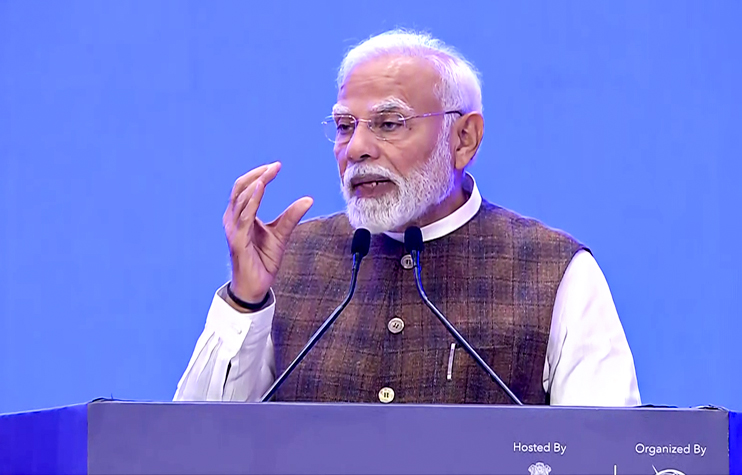Prime Minister Narendra Modi addressed the 4th National Conference of Chief Secretaries on Sunday, highlighting the importance of collaborative governance for realizing the vision of Viksit Bharat. The three-day conference, which took place from December 13 to 15, brought together officials from all states and Union Territories, along with experts and senior officers from the central government.
In his speech, Prime Minister Modi emphasized that the greatest benefit of the conference was the opportunity for “Team India” to engage in open dialogue and work together toward the common goal of a developed nation. He underlined that Pro-People Pro-active Good Governance (P2G2) is at the heart of the country’s efforts to achieve the vision of Viksit Bharat.
The conference, centered around the theme of ‘Promoting Entrepreneurship, Employment, and Skilling – Leveraging the Demographic Dividend,’ saw extensive discussions on how to unlock India’s potential by harnessing its demographic advantages. PM Modi praised the rise of start-ups, particularly in smaller Tier 2 and 3 cities, and encouraged states to create an environment conducive to innovation. He urged state governments to identify areas that can support entrepreneurs and take measures to connect them with financial institutions and essential logistics infrastructure.
The Prime Minister also called for the simplification of bureaucratic processes, which he said often lead to the harassment of citizens. He stressed the importance of reforming governance models to promote citizen participation, urging that states focus on reform, perform, and transform while also ensuring that citizens are well-informed about government initiatives.
On the topic of sustainability, Prime Minister Modi highlighted the success of the GOBARdhan programme, which has emerged as a key energy resource by turning waste into wealth. He urged states to explore funding opportunities for the recycling of e-waste, which is expected to rise in the future as India becomes more digitally advanced. By doing so, India can reduce its reliance on imported materials and promote a circular economy.
In the health sector, PM Modi called for greater attention to addressing obesity as part of the Fit India Movement, noting that only a fit and healthy population can contribute to building a Viksit Bharat. He also expressed confidence that India could eliminate tuberculosis by the end of 2025 and emphasized the important role that ASHA and Anganwadi workers would play in achieving this goal.
The Prime Minister also spoke about the need to digitize India’s ancient manuscripts, calling them a treasure that should be preserved through technology. He further emphasized the importance of continuously updating the PM GatiShakti platform to include indicators related to environmental impacts and disaster-prone areas, ensuring that India’s infrastructure growth remains sustainable.
PM Modi also lauded the Aspirational Districts and Blocks Programme, stressing that the right officers posted in these areas could bring about significant socio-economic changes. He called for focused human resources development to transform cities into hubs of economic growth, underscoring the importance of urban governance, water management, and adequate housing to support the increasing urban mobility.
Paying tribute to Sardar Vallabhbhai Patel on his death anniversary, PM Modi hailed Patel as an inspiration for civil servants and urged them to work towards realizing his vision for a united and strong India. He also encouraged citizens to draw inspiration from the freedom movement and work towards making India a Viksit Bharat by 2047, just as they came together for independence.
The conference sessions delved into several key themes, including manufacturing, services, renewable energy, and circular economy, with a strong emphasis on women-led development as a driving force for economic transformation. Experts discussed a multifaceted approach to harnessing the potential of India’s service sector, particularly in smaller cities, and promoted rural entrepreneurship through targeted skilling programs.
A key focus of the discussions was the PRAGATI platform, designed to accelerate infrastructure development through rigorous monitoring and reviews. A special session on Frontier Technologies examined how technological convergence could provide solutions to global challenges while positioning India as a leader in inclusive and sustainable growth. Another special session, Karmayogi, focused on capacity building for civil servants, highlighting the importance of democratizing learning and strengthening citizen-centric programs.














